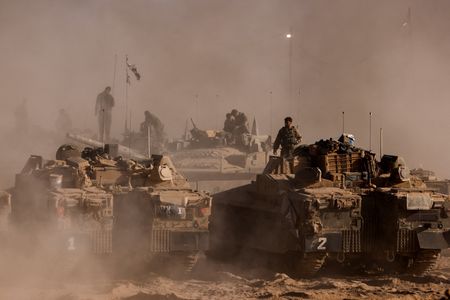By Emily Rose, Maayan Lubell and Nidal al-Mughrabi
JERUSALEM/CAIRO/GAZA (Reuters) -Tens of thousands of reservists started to report for duty on Tuesday ahead of a new Israeli offensive in Gaza City, which Prime Minister Benjamin Netanyahu wants to speed up, despite warnings from senior ranks.
Israeli Army Radio said that some 40,000 reservists would report for duty on Tuesday for the Gaza City offensive. The military said it was readying logistically for the intake of reservists ahead of the offensive.
Israel’s security cabinet, chaired by Netanyahu, approved a plan last month to expand the campaign in Gaza with the aim of taking Gaza City, where Israeli forces waged fierce urban warfare with Hamas in the early stages of the war. Israel currently holds about 75% of the Gaza Strip.
A security cabinet meeting late on Sunday included angry exchanges between Netanyahu and his ministers, who want to push ahead with the Gaza City offensive, and military chief Eyal Zamir, who has urged the politicians to reach a ceasefire deal.
Zamir said the campaign will endanger hostages and put further strain on the already over-stretched army, according to four ministers and two military officials present at the meeting.
This follows previous tense exchanges between Zamir and Netanyahu’s cabinet. Netanyahu said on August 20 that he gave instructions to speed up the timetable to take Gaza City, but the next day the military warned against hostages being endangered and said it could not begin the campaign for two months, according to a source in Netanyahu’s circle and a defence official.
The military’s main reason was that more time was needed for humanitarian efforts. But surveys have shown a proportion of reservists are unhappy with the cabinet’s plans, with some having taken the unusual step of openly accusing the government of lacking a cohesive strategy, a post-war plan for Gaza or clear victory metrics.
“I don’t feel like I’m doing anything that really applies significant pressure to have Hamas release the hostages,” one combat reservist who has been serving in Gaza since October 7 told Reuters, speaking on condition of anonymity as he was not authorized to speak publicly.
ISRAELI STRIKES
At least 86 people were killed in Israeli strikes across Gaza, and scores more were wounded in the past 24 hours, local health authorities said.
Three separate airstrikes killed 26 people in total in houses in the Gaza City suburbs, where the Israeli forces stepped up aerial and ground bombardment in preparation for expanding the fighting.
Outside Gaza City’s Al-Shifa hospital, white plastic body bags with corpses were laid out on the street spattered with blood. Crowds wailed for slain relatives.
“We fled (our homes) with nothing. They went to get clothes and food from their homes, to bring clothes for their children and food for themselves… and Look now! They came back as martyrs!” said Nasr Nasr, a relative of some of the dead.
Hundreds of mourners carried bodies through the streets. Others stood and prayed around a group of five bodies in shrouds, including three tiny children.
The Israeli army’s Arabic service spokesperson told residents of Gaza there would be better humanitarian services in the south, as the army prepared to expand the Gaza City offensive.
The Israeli military did not immediately respond to a request for comment but it has stated that its forces are combating fighters on the outskirts of Gaza City, destroying tunnels and militant infrastructure and seizing weapons.
Other deaths reported on Tuesday included five people killed while waiting in a food line in the south, nine killed in a strike on an apartment, and seven killed by Israeli tank fire.
Thirteen more Palestinians, including three children, died of malnutrition and starvation in Gaza in the past 24 hours, the territory’s health ministry said on Tuesday, raising officially reported deaths from such causes to at least 361, including 130 children, the vast majority in recent weeks.
Israel disputes the hunger fatality figures given by the health ministry of Gaza’s Hamas-run government, arguing that deaths were due to other medical causes.
The war in Gaza began on October 7, 2023, when gunmen led by Hamas attacked southern Israeli communities near the border, killing some 1,200 people, mainly civilians, and taking 251 hostages including children into Gaza, according to Israeli figures.
Over 62,000 Palestinians have been killed in Israel’s air and ground war in Gaza since then, according to Gaza health officials, who do not say how many were militants but have said most of those killed have been women and children.
Ceasefire talks that would see a pause in the fighting ended in a deadlock in July.
Israeli authorities believe that of the 48 remaining captives, 20 hostages are still alive.
(Reporting by Emily Rose and Maayan Lubell in Jerusalem, Nidal al-Mughrabi in Cairo, Dawood Abu Alkas in Gaza CityEditing by Peter Graff)











